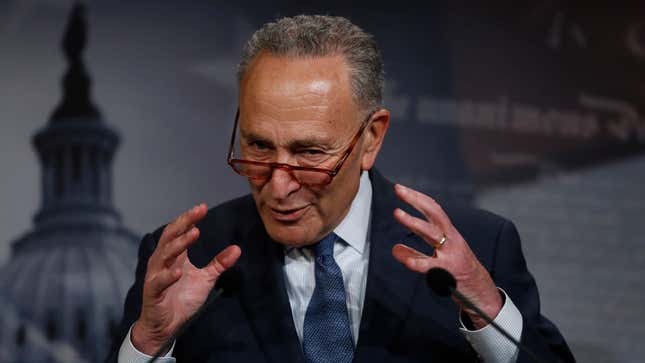
The U.S.-Mexico-Canada Agreement (USMCA), the Trump administration’s trade deal, passed 89-10 in the Republican-controlled Senate on Thursday with one high-profile defection: Senate Minority Leader Chuck Schumer.
Schumer, who as late as last month said he was still waiting to see the final text of the bill (and told Politico on Wednesday afternoon he was still on the fence) praised the deal’s “very good labor provisions.” But he issued a statement saying that the deal failed to advance “global climate security by outlining binding and enforceable climate commitments from all three countries,” and instead included handouts to the gas and oil industry like tar sands tariff rollbacks and incentives for manufacturers to move water- and air-polluting jobs to a looser regulatory environment in Mexico.
That last-minute no may have been motivated in part by Vermont Senator Bernie Sanders coming out strongly against the trade deal in Democratic primary debates this week. Sanders correctly cast trade agreements as a major climate issue. For example, the North American Free Trade Agreement (NAFTA) and other trade deals enabled mass outsourcing of pollution to poorer countries (but greenhouse gases don’t respect territorial boundaries). Provisions in the bill could also allow U.S. companies to undermine environmental laws by claiming they are burdensome to trade. And it doesn’t mention the term “climate change” once.
The U.S. Trade Representative’s office touted some increased environmental protections in the renegotiated deal, citing increased obligations to “combat trafficking in wildlife, timber, and fish,” protect marine species, and articles to reduce air and ocean pollution. But environmental groups had urged the Senate not to pass the bill. Earthjustice, Food and Water Action, Friends of the Earth, Greenpeace, the League of Conservation Voters, the Natural Resources Defense Council, Oil Change International, the Sierra Club, and the Sunrise Movement all signed a letter in December 2019 saying that the USCMA “ignores nearly all of the fundamental environmental fixes consistently outlined by the environmental community.
“The deal would contribute to the climate crisis by helping corporate polluters dodge our climate policies via outsourcing, leaving the controversial Investor-State Dispute Settlement system intact for the most polluting sectors in Mexico, and deepening North America’s reliance on tar sands oil and fracked gas,” the groups wrote. “It would perpetuate NAFTA’s ugly track record of helping corporations dump their toxic pollution in communities in Mexico and evade our hard-fought protections for clean air and water.”
In an analysis on their website, the Sierra Club argued that while the deal mentions air pollution, it omitted “essential limits on air, water, or land pollution.” Key multilateral environmental agreements and enforcement tools failed to improve on ineffective provisions in prior agreements, the Sierra Club added. The analysis added that the deal preserved methods for the U.S. to “sue Mexico over climate and environmental protections in private tribunals” and noted that the provisions enabling corporations to challenge proposed rules or demand the repeal of existing ones could hobble the U.S. government’s ability to undo Trump’s mass rollbacks of environmental law in the future.
Most Democrats in the Senate or running for president in 2020 backed the pact, though Sanders—one of the front-runners in the primaries—came out against it last month. Sanders said it was a “modest improvement over what we have right now” but “is not going to stop outsourcing. It is not going to stop corporations from moving to Mexico.”
“Second of all, every major environmental organization has said no to this new trade agreement because it does not even have the phrase ‘climate change’ in it,” Sanders said at a presidential debate this week. “And given the fact that climate change is right now the greatest threat facing this planet, I will not vote for a trade agreement that does not incorporate very, very strong principles to significantly lower fossil fuel emissions in the world.”
Beyond Sanders, billionaire Tom Steyer, who is campaigning mostly on environmental issues, told the debate audience that “if climate is your number one priority, you can’t sign a deal, even if it’s marginally better for working people until climate is also taken into consideration... We cannot put climate on the backseat all the time and say we’re going to sign this one more deal, we’re going to do one more thing without putting climate first. That’s why it’s my number one priority.”